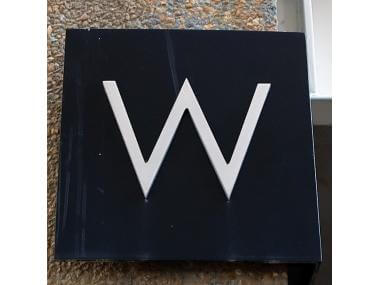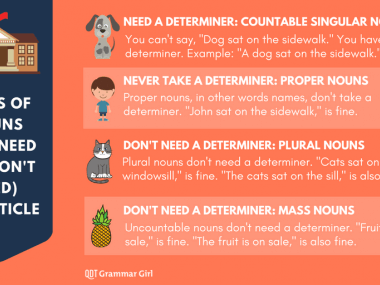Why Does It Sound Weird to End a Sentence with a Contraction?
Guest writer Neal Whitman answers the question ““Why is it OK to say ‘You’re correct’ or ‘You’re welcome’ but not ‘I’m smarter than you’re’?”
A listener named Rob tweeted me a question about contractions. He asked, “Why is it OK to say ‘You’re correct’ or ‘You’re welcome’ but not ‘I’m smarter than you’re’?”
This isn’t so much a question about grammar as about English phonology. It reminds me of a very short poem I read one time, which seems to have been written by someone named Ethel Barnett DeVito in the mid-20th century, though I haven’t been able to track it down fully. It seems to be a complaint about either highways or checkout lines, and it goes like this:
Wherever the place, whatever the time,
Every lane moves but the one where I’m.*
The poem is funny, at least in my opinion, not only because it’s so true, but also because in order to make a rhyme, the author has deliberately used the contraction “I’m,” which just doesn’t sound right in this situation. But why doesn’t it?
Some Words Have Strong Forms and Weak Forms
The Cambridge Grammar of the English Language describes the situation like this: Some English words, in particular function words such as pronouns, prepositions, and auxiliary verbs, have both strong and weak forms. For example, the strong form of the pronoun “you” is “you,” the way you pronounce it when you’re reading it all by itself. However, it also has a weak form, which you’ll hear in sentences like “What do ya want for lunch?” Did you hear how it was pronounced “yuh”? Sometimes this weak form is even spelled Y-A.
This is sometimes called careless pronunciation, but there are actually rules that speakers follow that prohibit weak forms in certain contexts. For example, if Aardvark were to ask Squiggly, “Who’s your buddy, Squiggly? Come on, who’s your pal?” Squiggly might say “You are,” or just “You,” but he wouldn’t say “Ya are” or “Ya.” This context calls for stress on “you,” and the weak form isn’t suitable for that.
The Cambridge Grammar notes that in addition to being available whenever a speaker wants to stress a word for emphasis, the strong form of a word is required in a handful of specific grammatical situations. In particular, it states that prepositions are stressed when they are the last element in a prepositional phrase, and auxiliary verbs when they are the last element in a verb phrase. For example, the preposition “to” has a weak form that sounds like “tuh.” It’s OK to use the weak form in a phrase like “We went to [“tuh”] the movies,” but not in a question like “Fenster is the person you should talk to.” It just sounds funny to say “Fenster is the person you should talk tuh.” For examples with auxiliary verbs, we have “I’m smarter than you are,” and “the one where I am,” with the strong forms “are” and “am.”
Words That Are Weaker Than Weak
Now as it happens, the weak forms of “are” and “am” in “I’m smarter than you’re” and “the one where I’m” are still not the weak forms. If they were, those lines would be “I’m smarter than you ’er,” and “the one where I ’em.” Did you hear the difference? I didn’t use the strong forms “are” and “am,” but I did still pronounce a vowel. If you read the transcript, you’ll see that I spelled these forms as “er” and “em” to show the pronunciation. But in “you’re” and “I’m,” there’s no vowel at all! “Are” and “am” have turned into just the consonants R and M. These are examples of a weaker-than-weak form that some auxiliary verbs have, a form so weak that it doesn’t even have a vowel of its own anymore, and it has to get one from a so-called host word. In “you’re” and “I’m,” the host words are the “you” and the “I.” The technical term for these super-reduced forms is “clitic,” from the Greek word meaning “to lean,” because these words depend on, or lean on, their hosts. You can also hear auxiliary verb clitics as the final consonant sound in contractions such as “she’s,” “he’d,” “they’ve,” and “we’ll.”
If you can’t even get an ordinary weak form of an auxiliary verb at the end of a verb phrase, you certainly aren’t going to get the cliticized versions in words like “you’re” and “I’m.” In fact, this rule even sheds some more light on the “where at” construction that we covered in episode 311. In that episode, we noted that “where at” neatly fills in the pattern involving “where” with other prepositions: “Where is she from?” has a preposition at the end, and so do some questions that use “where” to refer to a destination, such as “Where did they swim to?”
How We Get to ‘Where Is It At?’
Seen in that context, questions such as “Where are you at?” don’t stand out quite so much. Now we can also say that if you start to ask a “where” question and accidentally use a weak or cliticized form of “is” or “are,” you’re going to have a goofy-sounding sentence unless you find something else to finish it. “Where’s it?” and “I don’t know where you’re” are just going to confuse your listeners. The “at” can be seen as a rescue device to save the sentences, to turn them into the much more acceptable “Where’s it at?” and “I don’t know where you’re at.” We still don’t recommend “Where’s it at?” but understanding the pronunciation problem may help explain why some people say it.
All this still doesn’t quite answer Rob’s question of exactly why this rule of no weak prepositions or auxiliary verbs at the end of a phrase should be in effect. I don’t have an answer for that, and if any linguists out there know of some research that’s been done on this question, please leave a comment telling us about it. Whatever the reason, though, it’s still one of those interesting language rules that speakers follow unconsciously—or in Rob’s case, consciously.
#One source refers to this poem as coming from a sign on the back of a truck.





